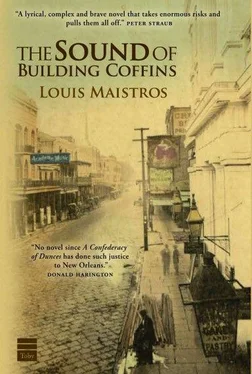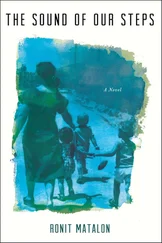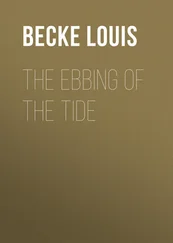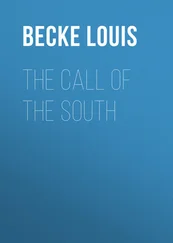And so she had waited. Going about her day to day life, but always, in the back of her mind; waiting.
Now .
Fifty-three years had passed with no sign of the thing that had gone into the canal. And now Coco Robicheaux, the Cajun bogeyman of children’s’ tales, had seen fit to plague her sleep with dreams; old, sour memories mixed with something new, and something darker still at the creases of her mind. In dreams, Coco Robicheaux is looking for her-without benefit of eyes.
Frances had known none of it. Had only walked around the house, leaving her damn shoes everywhere and searching for the ghost of her long dead Maria.
“Damn shoes.”
In fifty-three years not a word had been spoken between the sisters. Not to each other.
“Maria?”
Not directly.
Chapter twenty-one. Typhus
The sky was dark and moonless as the sound of footfalls thudded past. Nowhere near sleep, Typhus Morningstar heard them perfectly and ignored them completely.
The youngest of the Morningstar clan hadn’t slept much since the death of their father fifteen years ago. With so many unanswered questions having plagued him since then, Typhus’ youthful knack for understanding had long since left him of its own accord. Served him right, he figured, for being so smug in his judgment of grown-ups back then-their avoidance of bothersome truths being the last thing he really did fully understand nowadays.
In the now and so many years after Noonday’s passing, it was just Typhus, Malaria and Dropsy who kept on at the old house-along with the occasional and welcome addition of young West Bolden. For lack of anywhere else to go, Diphtheria’s nine-year-old spent most of his nights (and a great many of his days) here at the Morningstar place while his mother plied her trade on Basin Street.
Over the years Dropsy had grown from wispy and thin to thick and sturdy, but his inner transformation to manhood had been less plain. While the other Morningstar children allowed their spirits to harden at least marginally after the loss of their father, Dropsy had maintained a steadfast tenderness, never relinquishing his innocent fascination for everyday things. Some of Typhus’ earliest memories were of his older brother’s eyes examining the journeys of ordinary threads through ordinary fabric (be it shirt, rug, or sock) for long minutes. He imagined Dropsy’s wide brown eyes searching for hints of code, probing imagined or hidden meanings within the woven color of fabric-as if the fabric of an old shirt might also contain answers to the fabric of the universe itself. Dropsy, now twenty-five, never lost this odd penchant for rug pondering-and Typhus often found himself grinning with envy at the sight.
Conversely, the trauma of their father’s death had affected every inch of Typhus-or lack thereof. Quite literally: he had not grown an inch since that night-now standing no more than four and a half feet tall at age twenty-four.
With the coming of his own manhood, Typhus’ interests had become decidedly adult in nature, and, having the body-size of a child, such inclinations proved problematic. In his twenty-four years, Typhus had only known one woman in the biblical sense-that being an act of charity, a gift from Diphtheria on his sixteenth birthday. Diphtheria had paid an undisclosed sum to a pretty crib colleague called Hattie to take young Typhus on a night-long tour of her worldly skills. Although the experience had proved educational, there had been neither love nor convincing tenderness involved, and so the encounter served mainly to underline the profound sense of longing in his heart. With this dull, bitter longing came a dull ache, and with the dull ache came a dull anger, and with the dull anger came dull fear-and that fear was of being alone. Typhus began to wonder if a man in the shape of a boy could ever realistically hope to attain the tender touch of woman neither sister, nor whore, nor whore-hired-by-sister.
Doctor Jack’s keen spiritual radar picked up on the boy’s blue condition shortly after its manifestation, and he wasted no time addressing the problem in his own unique way:
“The love of a face you’ll never know is the purest love of all, Typhus,” he had proclaimed with soft eyes as he handed Typhus a paper present intended as cure. “That’s because the love you feel for an unknowing stranger has no conditions or demands. So, Typhus, give your love to Lily-and know that she will neither return your love nor break your heart. There is safety in a smile like hers.” Doctor Jack’s gaze shifted from Typhus’ eyes before concluding, just under breath, “If safety is a thing that you require.”
The gift was a picture of Lily-and it just happened that Lily was the prettiest lady Typhus had ever laid eyes on. So pretty, in fact, that Doctor Jack’s final mumbled sentence failed to register its intended warning in Typhus’ dizzy heart.
The photograph was printed on heavy, smooth paper measuring five by seven inches, with the following words imprinted in loopy French type along the bottom margin:
“ Daliet Aristo Finish, 517 Frenchmen Street, New Orleans. ”
The paper itself was light brown in color, dressed in sundry shades of chocolate ink with light burgundy highlights. A ham-handed studio artist had filled in Lily’s dress with pure white, giving the garment a detached and artificial quality. Its stark paleness provided an illusion of weightlessness, the dress appearing to drift a millimeter or so above the photo’s surface just beyond the two-dimensional logic of Lily’s chocolate-burgundy world. Anomaly of white aside, the dress infused Lily with an oddly virginal quality, complimenting her child’s smile and sparkling eyes; a miracle of irony within her rectangle of existence.
Lily sat in her chair; knees tight together, right hand in a loose fist on her lap. Her hair was thick and piled high, wisps of it escaping their frilly ties, tickling pretty at the edges of her eyes. Exaggerated and round, her deep black pupils and gently drooping eyelids suggested the effect of opium as they gazed at an odd angle, apparently seeing something of casual interest just left of the man behind the camera. Beside her was a small round table holding two shot glasses (one half-full, the other half-empty), a bottle of Raleigh Rye, a small round clock, a circular metallic pillbox, and a few other small objects (cosmetic items?) which Typhus couldn’t name. On the wall behind her hung several oddly shaped hand-carved frames tenanting images ranging from the vaguely religious to the vaguely obscene.
Diminishing to a thin edge of lace, the material of Lily’s nightgown encircled her throat elegantly, its hem riding less than an inch above her knees. Her left hand cupped her right breast; a crude gesture filtering itself through an improvised taxonomy of grace, defending its existence in terms of dim-witted innocence. Lily’s face was a tender juncture of perfect lines; slight curves converging and intersecting, swooping and gliding, her full lips barely meeting in an uneven smile, coaxing the slightest dimple from her right cheek, betraying the presence of any African blood that potentially swam beneath fair skin. In Storyville, they called girls with Lily’s complexion “high yella.” High yella also meant high-priced.
Typhus didn’t know how old the photograph might be; there was no date assigned it by the Daliet Aristo photographic studio. Had no way of knowing anything of Lily’s personal history-or even of the photo itself. He’d never seen her face in the flesh and didn’t realistically ever hope to do so. There were many whores in the district and he’d only occasion to see a handful, all of whom were friends or associates of his sister. No matter, for he had no intention of seeking Lily out in person-concrete knowledge or physical contact with her, he believed, could only harm the perfect type of love which Doctor Jack had described to him.
Читать дальше












